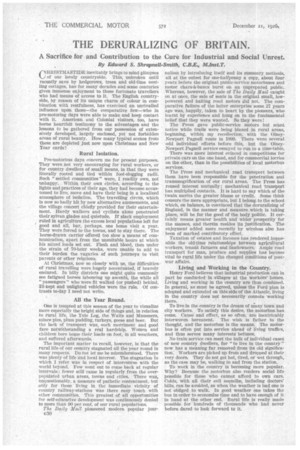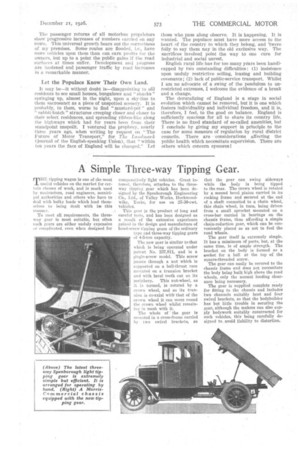THE DERURALIZING OF BRITAIN.
Page 52

Page 53

If you've noticed an error in this article please click here to report it so we can fix it.
A Sacrifice for and Contribution to the Cure for Industrial and Social Unrest. By Edward S. Shrapnell-Smith, C.B.E., M.Inst.T.
CHRISTMASTIDE inevitably brings to mind glimpses of our lovely countryside. This, unbroken until recently save by hedgerows, trees and old-time nestling cottages, has for many decades and some centuries given immense enjoyment to those fortunate travellers who had means of access to it. The English countryside, by reason of its unique charm of colour in combination with restfulness, has exercised an unrivalled influence upon those—the comparative few—who in pre-motoring days were able to make and keep contact with it. American and Colonial visitors, too, have borne heartfelt testimony to the advantages and the lessons to be gathered from our possession of extensively developed, largely enclosed, yet not forbidden areas of rural beauty. How many typical scenes from these are depicted just now upon Christmas and New Year cards?
Rural Isolation.
Pre-motorbus days concern me for present purposes. They were not very encouraging for rural workers, or for country dwellers of small means, in that they were literally rooted and tied within foot-slogging radii. Such "settled communities" were, I readily own, not unhappy. Within their own circles, according to the lights and practices of their age, they had become accustomed to live, move and have their being in a localized atmosphere of isolation. The travelling circus, which is now so badly hit by new alternative amusements, and the village concert chiefly provided for their entertainment. Hardy walkers and cyclists alone penetrated their sylvan glades and quietude. If slack employment ruled in agriculture the excess local populations left for good and all, bar, perhaps, one home visit a year. They were forced to the towns, and to stay there. The horse-drawn carrier offered too slow a means of communication, apart from the unsuitable hours at which his mixed loads set out. Flesh and blood, then under the strain of 70-hour weeks, were unable to add to their burden the vagaries of such journeys to visit parents or other relations. At Christmas, now so closely with us, the difficulties. of rural travelling were hugely accentuated, if bravely endured. In hilly districts one might quite commonly see fatigued horses labouring up ascents, the while all " passengers " who were fit walked (or pushed) behind. Ill-kept and unlighted vehicles were the rule. Of contrasts to-day I need not write.
Al] the Year Round.
One is tempted at this season of the year to visualize more especially the bright side of things and, in relation to rural life, the Yule Log, the Waits and Mummers, mince pies, plum pudding, turkeys, geese and beer. But the lack of transport was, such merriment and good fare notwithstanding a real hardship. Women and children bore home their loads on foot, in all weathers, and suffered afterwards.
The important matter to recall, however, is that the rural life of our country stagnated all the year round in many respects. Do not let me be misunderstood. There was plenty of life and local interest. The stagnation to which I refer was in respect of intercourse with the world beYond. Few went out to come back at regular intervals; fewer still came in regularly from the overpopulated urban areas, towns and cities. There was, unquestionably, a measure of pathetic contentment, but .only for those living in the immediate vicinity of country railway-stations was there easy touch with other communities. This greatest of all opportunities fer self-educative development was continuously denied to more than 90 per cent. of our rural populations.
The .Daily Hail pioneered modern popular jour
c30 •
nalisin by introducing itself and its summary methods, all at the outset for one-halfpenny a copy, about four years before the original public-service motorbuses and motor chars-h-bancs burst on an unprepared public. Whereas, however, the sale of The Daily Hail caught on at once, the sale of seats in the original small, lowpowered and halting road motors aid not. The comparative failure of the latter enterprise some 27 years ago was, happily, taken to heart by the pioneers, who learnt by experience and hung on to the fundamental belief that they were wanted. So they were!
The Press gave public-service motors but scant notice while trails were being blazed in rural areas, beginning, within my recollection, with the OlneyNewport Pagnell route in 1899. There were several odd individual efforts before this, but the OlneyNewport Pagnell service essayed to run to a time-table.
There was more interest evinced in competitions for private cars on the one hand, and for commercial lorries on the other, than in the possibilities of local motorbus services.
The Press and mechanical road transport between them have been responsible for the penetration and transmogrification of our rural areas. The Press has roused interest mutually ; mechanical road transport has multiplied contacts. It is hard to say which of the twain merits the greater blame or credit. Some think censure the more appropriate, but I belong to the school which, on balance, is convinced that the deruralizing of England, in the manner and measure which is taking place, will be for the good of the body politic. It certainly means greater health and wider prosperity for the masses, and therein resides its justification. The enjoyment added more recently by wireless also has been of marked contributory effect.
Taxation of estates and incomes has rendered inipessible the old-time relationships between agricultural workers, tenant farmers and landowners. Ample road transport for man, produce and supplies has become vital to rural life under the changed Conditions of postwar affairs.
Living and Working in the Country.
Henry Ford believes that industrial production can in part be conducted • in villages at the workers' homes. Living and working in the country are thus combined. In general, as must be agreed, unless the Ford plan is adopted and extended on this side of the Atlantic, living in the country does not necessarily connote working there. • To live in the country is the dream of many town and city workers. To satisfy this desire, the motorbus has come. Cause and effect, as so often, are inextricably interwoven hereanent.. The wish is father to the thought, and the motorbus is the means. The motorbus is often put into service ahead of living traffics, and thus serves many interests betimes.
No train service can meet ilie bulk of individual cases of new country dwellers, for "to live in the country" now has a meaning far removed•from its old signification. Workers are picked up from and dropped at their very doors. They do not get hot, tired, or wet through, as the case may be, walking to and from the station.
To work in the country is becoming more popular. Why? Because the motorbus also renders social life possible for those who cannot afford to WA cars. Colds, with all their evil sequelhe, including doctors' bills, can be avoided, as when the weather is bad one is not obliged to walk. In good weather one takes the bus in order to economise time and to have enough of it in hand at the other end. Rural life is really made possible for hundreds of thousands who had never before dared to look forward to it. The passenger returns of all motorbus proprietors show progressive increases of numbers carried on any route. This universal growth bears out the correctness of my premises. Some routes are flooded, i.e., have more vehicles upon them than can earn profits for the owners, but up to a point the public gains if the road surfaces at times suffer. Development and progress are hastened and passenger traffic by road increases in a remarkable manner.
Let the Populace Know Their Own Land.
It may be—it without doubt is—disappointing to ola residents to see small houses, bungalows and " shacks " springing up, almost in the night, upon a sky-line to them sacrosanct as a piece of unspotted scenery. It is probably, to them, worse to find "mustard-pot " and " rabbit-hutch " structures creeping closer and closer to their select residences, and spreading ribbon-like along the highways which had for years been front their standpoint unspoilt. I ventured the prophecy, nearly three years ago, when writing by request on "The Future of Motor Transport," for The Landmark (journal of the English-speaking Union), that "within ten years the face of England will be changed." Let those who pass along observe. It is happening. IL is wanted. The populace must have more access to the heart of the country to which they belong, and 'twere folly to say them nay in the old exclusive way. The sacrifices involved point the way to one cure for industrial and social unrest.
English rural life has for too many years been handicapped by two outstanding difficulties: (1) insistence upon unduly restrictive selling, leasing and building covenants; (2) lack of public-service transport. Whilst I am no advocate of a swing of the pendulum to unrestricted extremes, I welcome the evidence of a break and a change.
The deruralizing of England is a stage in social evolution which cannot be removed, but it is one which fosters individuality and individual freedom, and it is,. therefore, I feel, to the good on balance. England is sufficiently spacious for all to share its country life. There is no fixed standard of so-called amenities, but
conclude by giving my support in principle to the case for some measure of regulation by rural district councils. There are -considerations affecting the public health which necessitate supervision. There are others which concern eyesores!












































































































